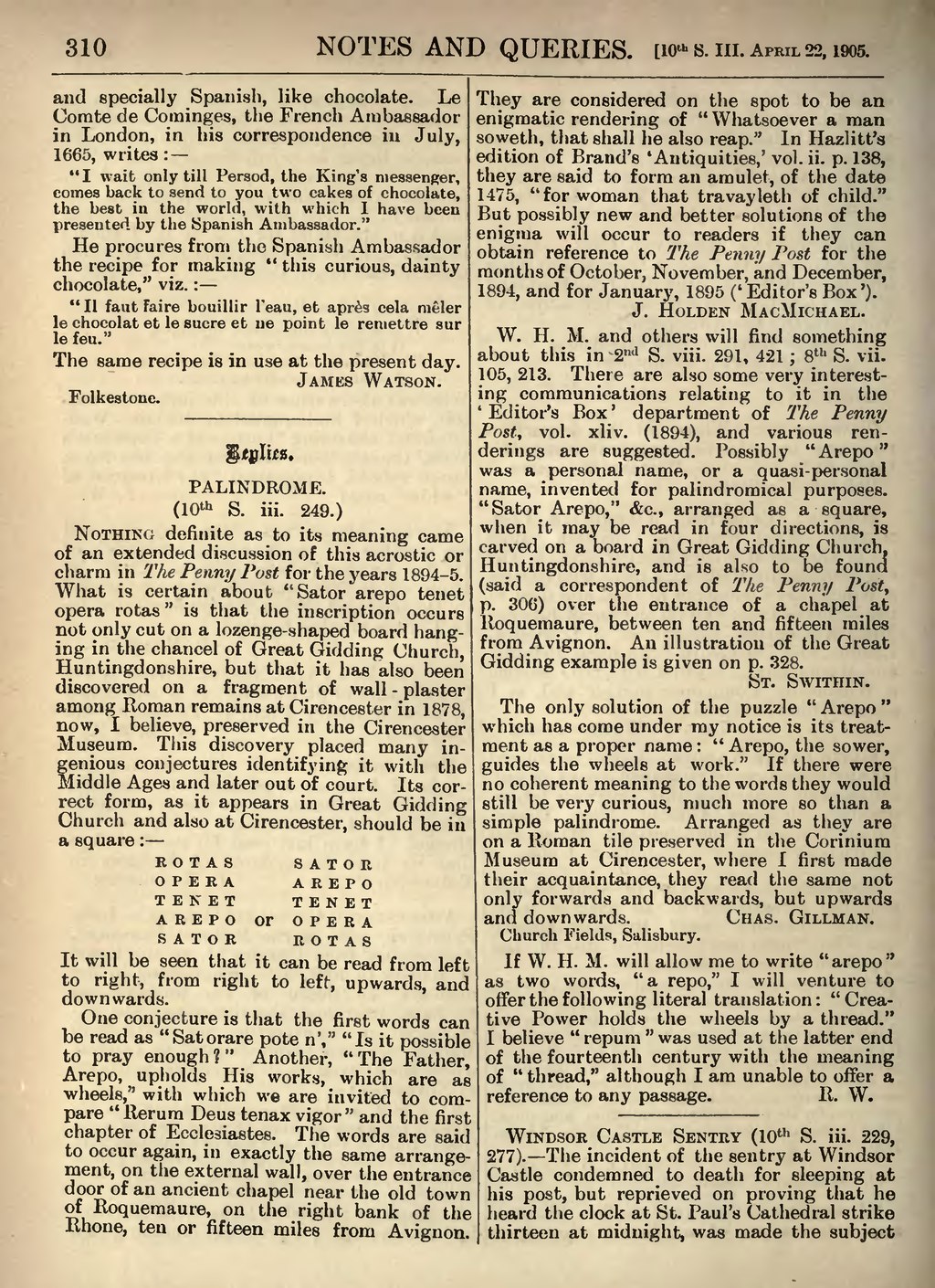310
NOTES AND QUERIES. [io* s. in. APRIL 22, iocs.
and specially Spanish, like chocolate. Le
Comte cle Cominges, the French Ambassador
in London, in his correspondence iu July,
1665, writes :
"I wait only till Persod, the King's messenger, comes back to send to you two cakes of chocolate, the best in the world, with which I have been presented by the Spanish Ambassador."
He procures from the Spanish Ambassador the recipe for making " this curious, dainty chocolate," viz. :
"II faut faire bouillir 1'eau, et apres cela nieler le chocolat et le sucre et ne point le remettre sur le feu."
The same recipe is in use at the present day.
JAMES WATSON. Folkestone.
PALINDROME.
(10 th S. iii. 249.)
NOTHING definite as to its meaning came of an extended discussion of this acrostic or charm in The Penny Post for the years 1894-5. What is certain about "Sator arepo tenet opera rotas " is that the inscription occurs not only cut on a lozenge-shaped board hang- ing in the chancel of Great Gidding Church, Huntingdonshire, but that it has also been discovered on a fragment of wall - plaster among Roman remains at Cirencester in 1878, now, I believe, preserved in the Cirencester Museum. This discovery placed many in- genious conjectures identifying it with the Middle Ages and later out of court. Its cor- rect form, as it appears in Great Gidding Church and also at Cirencester, should be in a square :
ROTAS S A T O R
OPERA
TENET
AREPO
SATOR
or
AREPO
TENET
OPERA
ROTAS
It will be seen that it can be read from left
to right, from right to left, upwards, and
downwards.
One conjecture is that the first words can be read as "Satorare pote n'," "Is it possible to pray enough?" Another, "The Father Arepo, upholds His works, which are a: wheels," with which we are invited to com pare "llerum Deus tenax vigor" and the first chapter of Ecclesiastes. The words are saic to occur again, in exactly the same arrange- ment, on the external wall, over the entrance door of an ancient chapel near the old town of Roquemaure, on the right bank of the Rhone, ten or fifteen miles from Avignon
They are considered on the spot to be an
nigmatic rendering of " Whatsoever a man
soweth, that shall he also reap." In Hazlitt's
edition of Brand's 'Antiquities,' vol. ii. p. 138,
hey are said to form an amulet, of the date
L475, "for woman that travayleth of child."
But possibly new and better solutions of the
nigma will occur to readers if they can
obtain reference to The Penny Post for the
months of October, November, and December,
1894, and for January, 1895 ('Editor's Box').
J. HOLDEN MACMlCHAEL.
W. H. M. and others will find something about this in-2 ml S. viii. 291, 421 ; 8 th S. vii. 105, 213. There are also some very interest- ing communications relating to it in the Editor's Box' department of The Penny Post, vol. xliv. (1894), and various ren- derings are suggested. Possibly "Arepo" was a personal name, or a quasi-personal name, invented for palindromical purposes. "Sator Arepo," &c., arranged as a square, when it may be read in four directions, is carved on a board in Great Gidding Church, Huntingdonshire, and is also to be found (said a correspondent of The Penny Post, p. 306) over the entrance of a chapel at Roquemaure, between ten and fifteen miles from Avignon. An illustration of the Great Gidding example is given on p. 328.
ST. SWITHIN.
The only solution of the puzzle " Arepo " which has come under my notice is its treat- ment as a proper name : " Arepo, the sower, guides the wheels at work." If there were no coherent meaning to the words they would still be very curious, much more so than a simple palindrome. Arranged as they are on a Roman tile preserved in the Corinium Museum at Cirencester, where I first made their acquaintance, they read the same not only forwards and backwards, but upwards and downwards. CHAS. GILLMAN.
Church Fields, Salisbury.
If W. H. M. will allow me to write "arepo" as two words, "a repo," I will venture to offer the following literal translation: "Crea- tive Power holds the wheels by a thread." I believe " repum " was used at the latter end of the fourteenth century with the meaning of "thread," although I am unable to offer a reference to any passage. R. W.
WINDSOR CASTLE SENTRY (10 th S. iii. 229,
277). The incident of the sentry at Windsor
Castle condemned to death for sleeping at
his post, but reprieved on proving that he
heard the clock at St. Paul's Cathedral strike
thirteen at midnight, was made the subject
